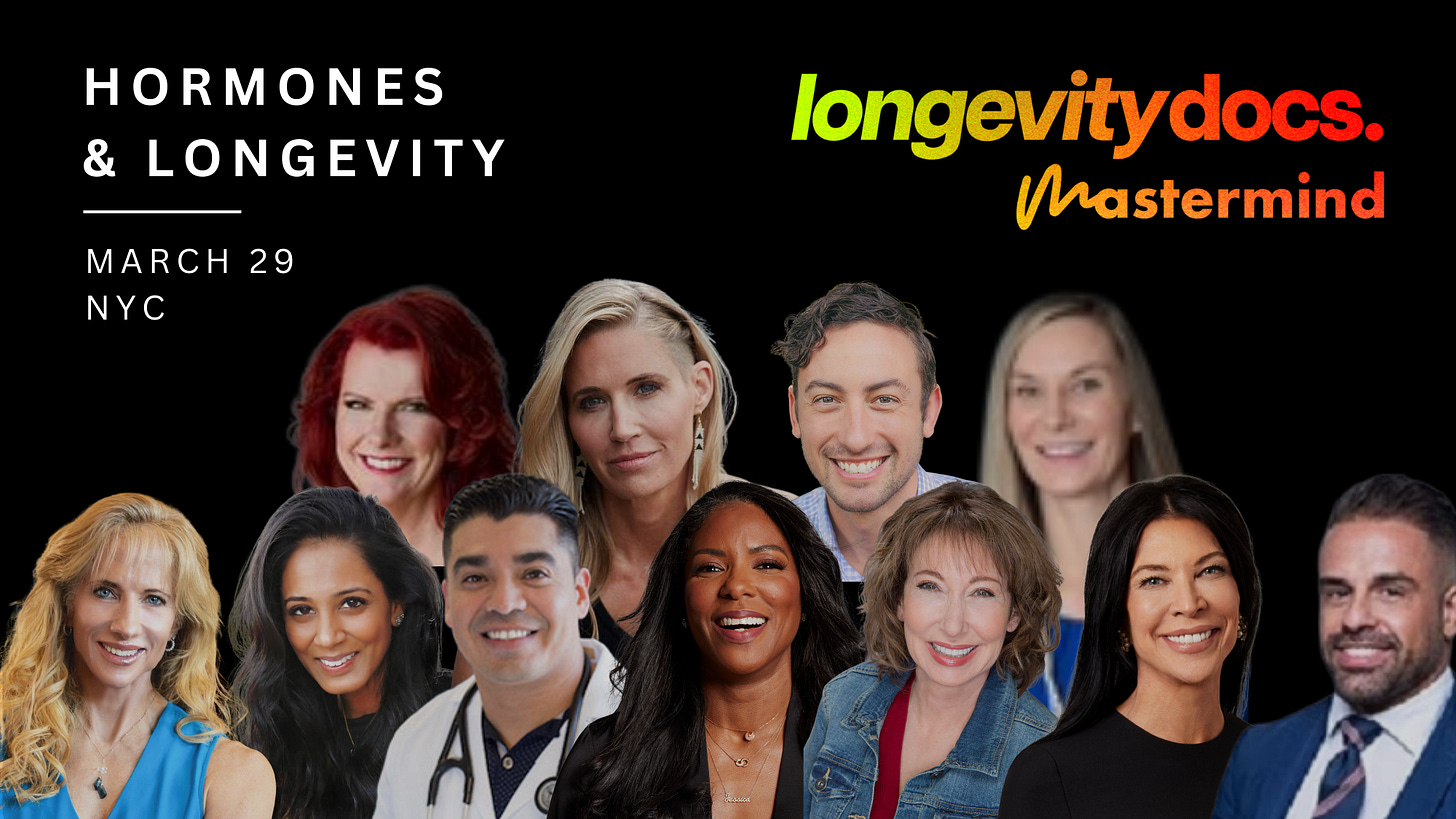Longevity registry • GLP-1 and cancer misinformation • Chief Longevity Officer • Hormones Mastermind
Your sneak peek into the world of Longevity Docs.
Longevity must move beyond N-of-1 experimentation
Hey Docs,
In recent weeks, many physicians have raised concerns about the growing trend of medication self-experimentation and biohacking. Traditionally, we have served as the gatekeepers of medical decisions: diagnosing, prescribing, and managing disease.
But the landscape is changing. Today, patients are empowered to seek solutions independently, turning to online pharmacies, walk-in clinics, and social media influencers for guidance. Medicine has shifted from a trusted service to a commodified product.
I believe the future lies in a model where physician-powered, decentralized registries replace isolated N-of-1 experimentation. By pooling real-world evidence, we can advance collective medical intelligence to guide responsible innovation. This includes initiatives like our GLP-1 Longevity Registry, which tracks biomarkers, patient outcomes, and side effects to create an evidence-based foundation for emerging therapies.
As misinformation floods social media, our role as trusted voices has never been more critical. Through initiatives like our Hormones Mastermind to educate doctors on new approaches, we can equip ourselves with the tools to guide patients responsibly.
I believe in the rise of roles like the Chief Longevity Officer highlights the growing intersection of medicine, technology, and leadership. Doctors are increasingly moving beyond daily practice to influence healthcare innovation, startups, and corporate strategies, redefining how longevity medicine shapes the future of health.
In this fast-paced world of tech, AI, and social media, our role as physicians must evolve. How can we remain independent, shape technology for good, and guide public understanding responsibly? As doctors, we carry a unique duty - to protect and save lives.
Happy Sunday!
David
#LongevityMindset
Launching Longevity Registries: Moving Beyond N-of-1 Experimentation
For years, longevity medicine has been shaped by N-of-1 research: physicians, biohackers, and patients experimenting with interventions on an individual basis. While this approach has fueled innovation, it lacks the scale, reproducibility, and credibility needed to move from anecdote to evidence-based practice.
Recently, high-profile longevity influencers have sparked intense debate within the medical community over the limitations of N-of-1 research and the dangers of unstructured experimentation in this rapidly growing field. Without standardized data collection and scientific rigor, longevity medicine risks being driven more by hype than by validated science.
As a young cardiac surgery resident, I spent countless hours filling out registries to track outcomes and improve performance. Just as surgeons relies on these systems to refine techniques and improve patient care, longevity physicians must adopt shared data practices to build trust, enhance transparency, and improve clinical outcomes in this rapidly evolving field.
We need independent, publishable data.
Publishing outcomes and insights is essential for advancing longevity medicine. Yet, most research is industry-sponsored or grant-funded, leaving independent physicians unable to share their findings. This limits real-world data visibility, creating an evidence gap that registries can help bridge. By decentralizing and standardizing data collection, physicians can contribute to a growing body of collective medical intelligence without relying on industry funding.
Launching a Decentralized Longevity Registry for GLP-1
The Longevity Docs Institute is leading a decentralized initiative to study the outcomes and side effects of GLP-1 medications. Initially offered to dozens of physicians across the U.S., this registry will serve as a real-world, evidence-based study—essentially a phase 4 clinical trial for longevity medicine.
Our approach goes beyond traditional clinical measures by integrating advanced longevity biomarkers (inflammatory, metabolic, and cellular senescence markers) with patient-reported outcomes, including body composition (visceral fat, bone density), strength, mood, cognitive function, skin health, and side effects.
By combining objective biometrics with subjective patient experiences, we aim to create a clearer, data-driven picture of how GLP-1 impacts healthspan and quality of life.
How This Data Will Be Used
This registry is more than just a data collection tool- it will have real-world applications that shape the future of longevity medicine.
1. Personalizing longevity medicine: will help physicians help identify which patients benefit most from GLP-1 therapies, refine GLP-1 prescribing and tailor treatments based on biomarker responses
2. Shaping clinical guidelines: aggregated data can inform medical boards helping to establish best practices in longevity care.
3. Building transparency & trust: by publishing independent, physician-led studies, the registry will provide credible, non-commercial insights to counter misinformation and unverified claims in the longevity space.
While N-of-1 research fuels innovation, longevity registries provide the validation needed to advance the field responsibly. This isn’t just about GLP-1, it’s about setting a new standard for clinical research, shifting from isolated experimentation to collective medical intelligence driven by structured, evidence-based, decentralized data that delivers real impact.
If you’re a physician passionate about advancing evidence-based longevity medicine, join our community.
GLP-1 and thyroid cancer: Fact vs. Fear
Buzz: A heated debate erupted on social media over claims that GLP-1 receptor agonists increase thyroid cancer risk by 58%. Many in the longevity community pushed back, pointing out that the concern is largely driven by increased screening rather than solid clinical evidence. While some posts fueled fear, others highlighted research suggesting that GLP-1 drugs may even have protective effects against certain cancers.
Key Takeaways:
No conclusive evidence links GLP-1s to thyroid cancer; increased detection may be due to more frequent screening.
Experts called out misinformation, emphasizing the need for balanced, evidence-based messaging in public health communication.
Further research is needed to clarify any potential long-term risks, but current data does not justify alarmism.
Longevity thought leaders: influence or misinformation?
Buzz: the impact of high-profile longevity influencers, with strong opinions on whether their content helps or misleads the public. Some praised their ability to bring longevity science into mainstream conversations, while others criticized exaggerated claims, cherry-picked data, and commercial interests influencing their narratives.
Key Takeaways:
Longevity influencers have impact, but their messaging often lacks scientific rigor.
Skepticism is growing around self-experimentation and extreme biohacking claims.
More transparency and peer-reviewed research are needed to separate fact from hype.
Some Docs are approached by Public relations Agencies - is it worth it?
Buzz: A debate emerged about whether PR is a worthwhile investment for longevity experts. While PR can enhance credibility and media relationships, it’s costly and doesn’t directly bring in qualified patients. Many agreed it’s best for launching major initiatives like a book, clinic, or startup, but it’s no substitute for word-of-mouth referrals. Social media and podcasting were highlighted as more affordable, long-term strategies for authority building.
Key Takeaways:
PR builds credibility but isn’t a direct patient acquisition tool. Word-of-mouth remains most effective.
Best suited for launching major initiatives; high costs ($50K to $120K/year) require significant ROI to justify.
Social media and podcasting offer consistent, lower-cost alternatives for growing a brand.
Clear and unique value proposition are essential before investing in PR.
Welcoming New Members
Elizabeth Roydier, MD, PhD: Zurich, Switzerland
George Delanay, MD: Edmonds, WA, USA
Grant Fraser: Spencer, TN, USA
Craig Seicshnaydre, MD: Mandeville, LA, USA
Saima Ajaz, MD: London, UK
Artur Garmash, MD: Dnipro, Ukraine
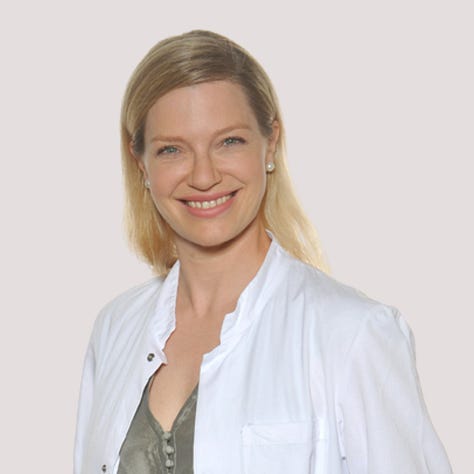
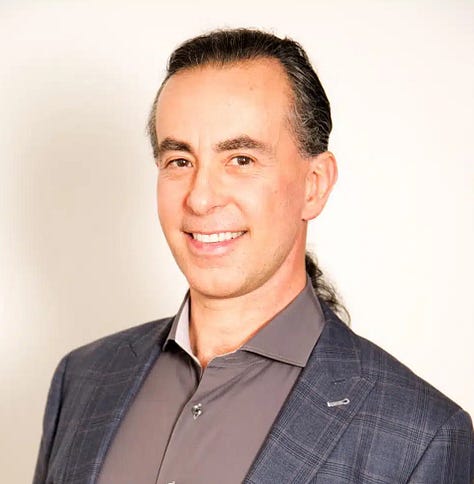
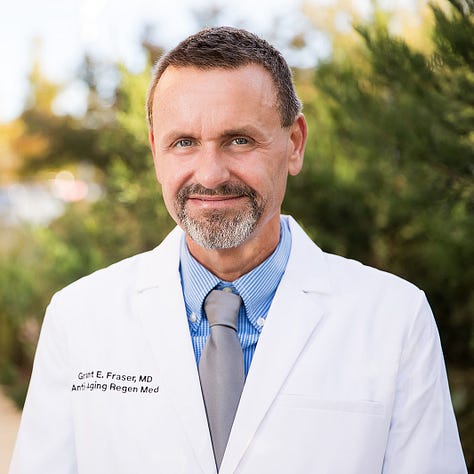
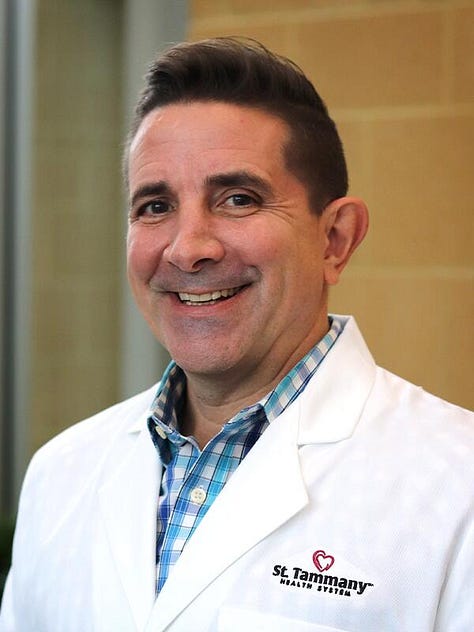

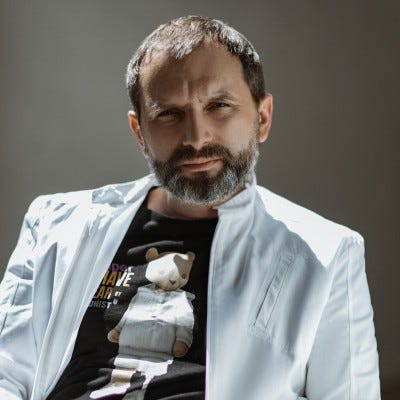
What’s Hot? by Dr. David Luu
The Rise of the Chief Longevity Officer in tech startups?
Based on an recent article Doctors in the C-suite, I asked our community about preferences for becoming a Chief Medical Officer (CMO) in a startup. The poll revealed an intriguing trend: 17 docs indicated they would take a position as a CMO, compared to just 7 who preferred to stay independent practitioners while building their own practice and brand. A smaller group expressed curiosity, indicating they might explore the role if presented with an opportunity.
While this poll is not formal research and may be subject to bias, it sparked a fascinating discussion about the evolving aspirations of longevity-focused physicians. Experienced doctors in this field appear increasingly excited by the prospect of moving beyond daily clinical practice to influence larger systems.
The appeal of becoming a "Chief Longevity Officer" lies in the opportunity to shape how longevity science and medicine are integrated into diverse industries, driving innovation and improving systems on a broader scale. This shift hints at a growing desire among longevity-focused doctors to lead at the intersection of medicine, technology, and business.
The results suggest a new trend in the making, where physicians transition from direct patient care to roles that redefine the future of health and wellness. Could this be the beginning of a new era for longevity experts in leadership? It’s a question worth exploring.
Plasma proteomic evidence for increased β-amyloid pathology after SARS-CoV-2 infection
While these results do not establish causality, they suggest that SARS-CoV-2 (and possibly other systemic inflammatory diseases) may increase the risk of future Alzheimer’s disease.
Nature Medicine – Recommended by Robin Rose
Bioaccumulation of microplastics in decedent human brains
The results highlight a critical need to better understand the routes of exposure, uptake and clearance pathways and potential health consequences of plastics in human tissues, particularly in the brain.
Nature Medicine – Recommended by Mona Ezzat-Velinov
GLP-1RA use and thyroid cancer risk
These findings indicate that GLP-1RA initiation was associated with new diagnosis of thyroid cancer only in the short term, likely due to increased vigilance and case detection rather than de novo pathogenesis.
JAMA – Recommended by Sajad Zalzala
Distribution of Coronary Artery Plaque Volume by Artificial Intelligence Quantitative Coronary CT Angiography in General Population: Results from the Miami Heart Study
In this asymptomatic population without known CAD, 93.1% of men and 84.6% of women had CAD detected using AI-QCT.
Circulation – Recommended by Mark Gordon
Longevity Docs Events
Coming Next
Longevity Docs Club Forum
📅 Date: February 28, 2025
📍 Location: Virtual
This event is reserved for private members of the Longevity Docs Club
Longevity Docs Hormones Mastermind
📅 Date: March 29, 2025
📍 Location: Convene 101 Park Ave, New York (In-person & Digital Access Available)
One-day, 10-course curriculum
featuring dozen world-renowned experts, offering an unique opportunity to elevate your expertise in hormonal health and longevity medicine.
Learn directly from an unparalleled lineup of physicians, including:
Drs. Amy Killen, Jessica Shepherd, Elizabeth Yurth, Angela DeRosa, Salome Masghati, Juan Bautista, Felice Gersh, Melissa Loseke, Marcos de Andrade, Elizabeth Poynor, Kyle Gillett.
Longevity Docs Cannes
📅 Date: June 25-26, 2025
📍 Location: Palace of Festival, Cannes - France
Others Events
Founders Longevity Forum - Singapore, February 27-28
Vitalist Bay - Berkeley, CA, Apr 4 - May 29
The Longevity Med Summit - Lisbon, May 6-8
Life Summit - Berlin, May 27-28
Doctors in the C-suite
Burned-out physicians are ditching the operating room for the board room. In the new age of medicine, the call to be a doctor may increasingly come from the tech world.
Anti-ageing jabs – they can rejuvenate mice, but will they work on humans?
Senescent cells power the body's ageing process, and scientists are developing treatments to annihilate them.
Marijuana Dependence Linked to Higher Risk of Death
Two new Canadian studies are the largest to date looking at death rates and psychosis associated with cannabis use disorder.
At Longevity Docs, we offer two distinct membership to support doctors in longevity medicine:
Basic Membership
Become part of a global network of 300 longevity-focused physicians across 50 countries, access to our app, educational resources, and opportunities to attend exclusive events.
Private Club Membership
For those seeking a more immersive experience, the Private Club Membership offers all the benefits of Standard Membership, plus exclusive access to private events, monthly forums, deeper collaboration with experts, and early insights into cutting-edge longevity practices.
Eligibility: Open exclusively to medical doctors operating a healthcare practice or leading a business dedicated to longevity.
Every Doctor Should be a Longevity Doctor
As a heart surgeon, I was often the doctor you hoped never to need . If you were in my operating room it means prevention was no longer an option. My father, a physician specializing in Chinese medicine and acupuncture, taught me about preventive care very early on. At 21, in 2001, I launched a foundation focused on operating on children in Africa, India, Cambodia, and Haiti so they could live longer, healthier lives.
In 2020, everything changed. When my wife contracted COVID-19, I realized the future of medicine lies in prevention. This led me to found a digital clinic dedicated to combating preventable age-related diseases, immersing myself in longevity research and new tech.
However connecting with like-minded doctors was the hardest part. I started a WhatsApp group with a dozen doctors passionate about longevity. We shared publications, new tech tools, and discussed case studies. It quickly grew into something bigger, and I realized we lacked a structured platform to learn, exchange insights, and shape the future of evidence-based longevity medicine.
From this need, Longevity Docs was born. Today, we unite 300 physicians across 50 countries with a shared goal: to democratize longevity medicine. Imagine a world where physicians have access to evidence-based practices, collaborate with experts, and conduct research together - in real-time, anywhere in the world.
I firmly believe that a decentralized, collective intelligence of physicians is the key to extending human healthspan. Together, we can create a legacy where medicine helps people live better.
Dr. David Luu
Subscribe to the Longevity Docs Newsletter
Stay connected with the backstage of the Longevity Docs community, a network of over 300 physicians spanning 50 countries, united in our mission to democratize longevity medicine. Explore the latest in evidence-based longevity care, gain exclusive access to physician insights, and join us in shaping the future of this transformative field.
Newsletter Disclaimer:
The content shared in this newsletter, including the "Buzz in the Chat" section, is for educational purposes only. It is derived from peer-to-peer conversations among physicians within the Longevity Docs community and is intended to inform and engage our network of doctors.
Please note that these discussions do not reflect the official position of Longevity Docs and are not to be interpreted as medical advice or recommendations. The insights and opinions shared are those of individual physicians and are provided as part of our mission to foster collaborative learning and dialogue among healthcare professionals.
We encourage all readers to consult qualified healthcare professionals for personalized medical advice and to evaluate any medical information in the context of their clinical expertise and patient needs.












